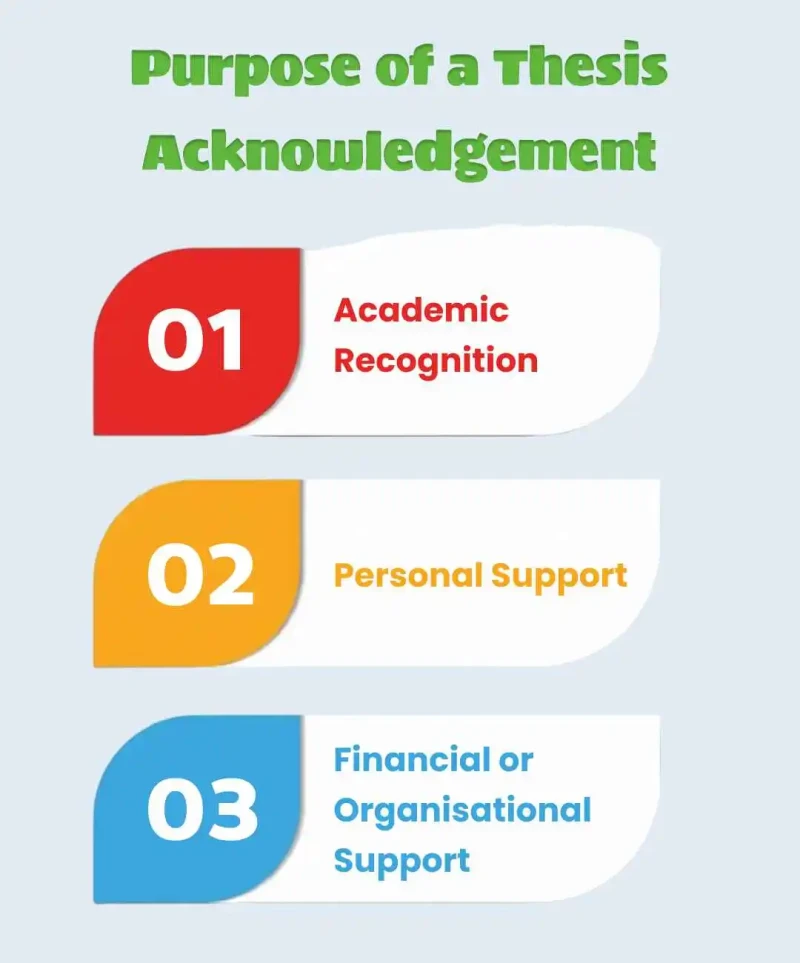Methods of Primary Data Collection in Research Methodology
Master the top methods of primary data collection in research methodology. Learn to use surveys, interviews, and experiments to gather original, high-quality data.

Williams
An Acknowledgement for a thesis is not just a requirement but also an expression of gratitude in its truest sense, reflecting sincerity and professionalism. This section allows researchers to acknowledge the academic, institutional, and personal support that made their work possible.
For scholarly writing, a good acknowledgement demonstrates sincerity, ethical awareness, and academic courtesy.
By the end of this blog, you’ll clearly understand what a thesis acknowledgement is, why writing a thesis acknowledgement matters, and how to write one that meets academic standards and formatting requirements.

Formal thesis acknowledgement is a verbal expression of appreciation to formally acknowledge those individuals who have contributed to the success of your research endeavour, directly or indirectly. It brings into focus academic mentorship, individual inspiration, and external assistance gained during the study.
Expressing gratitude towards academic advisors, professors, and the university is the cornerstone of any thesis acknowledgement. Their advice influences the study design, research strategy, and academic depth that characterise your work. This is also an formatting your thesis, which helps to establish proper academic decorum and consistency.
Behind each successful researcher is a team of family, friends, and colleagues who provide emotional support, encouragement, and empathy throughout the challenging moments of thesis writing. Identifying them gives your acknowledgement its human and personal touch.
Financial grants, scholarships, or institutional funding often go a long way in many instances in supporting research. Thanking sponsors, funding agencies, or organisations that supported your research displays academic honesty and openness regarding the funds underpinning your research.
The correct Acknowledgement for Thesis consists of a fair acknowledgement of academic, professional, and personal assistants. All the acknowledgements must be descriptive and relevant, portraying the order of influence on your research study.
Start by thanking your research advisors, supervisors, and members of the committee. Your academic advice, guidance, and valuable comments have a great impact on the direction and quality of your study.
Thank your departmental and university staff personnel who have offered resources, facilities, and administrative assistance. Coordination with them facilitates the smooth conduct of research work and documentation.
Thank peers, research associates, and lab-mates who assisted intellectually or technically. Their combined knowledge possesses the ability to strengthen and validate your findings.
Acknowledge the support and encouragement of close relatives and family members. Their personal support often motivates students to navigate the most challenging phases of thesis completion.
Finally, acknowledge sponsors who are outside the organisation, scholarship donors, or funding organisations. Sponsorship, funding sources, and institutional affiliation all play key roles in the successful accomplishment of research objectives.
A Professional yet Sincere Acknowledgement for Thesis will be professional but sincere. Sincere tone and proper style of writing will make your appreciation sincere but scholarly. Adopt these strategies in order to achieve that.
Make your thank-you page brief 250 to 400 words. Avoid extraneous detail and lengthy lists of people. Start with thank you, and then break down by category (institutional, academic, personal) into brief paragraphs. Chronicle it and be more succinct on thanks than reading experience.
Be in order of formality begin with scholarly appreciation, proceed to institutional or professional appreciation, and conclude with appreciation to persons. This order preserves your scholarly respect and makes your Acknowledgement for Thesis sound sincere and heart-felt-sounding. The supervisors, colleagues, and departments before family members and friends.
It strikes a balance between being professional and warm. Refrain from using exaggerated words such as “a big thank you” or exaggerated dramatisations. Use polite and genuine words such as “I am very thankful to…” or “I am greatly appreciative of…”. The tone should be emotionally engaging without breaching academic sincerity.
Composing an Acknowledgement for a Thesis is a formal corporate job that requires keen focus on tone, order, and usage. The do's and don'ts presented below are exact guidelines to render your acknowledgements scholarly, authentic, and correctly formatted.
Always compose sincere thanks to the individual who assisted your research. Express designations, names, or institutions openly, and declare their contribution truthfully so that your acknowledgements are informative and personal.
Organise acknowledgements in a logical order, beginning with academic mentors, progressing to institutional and professional assistance, and ending with personal appreciation towards family or friends who gave emotional encouragement and courtesy.
Use a professional and academic tone throughout. Use sentences such as "I would like to extend my most sincere appreciation to…" to express courtesy and respect without overexcess or misplaced in presentation.
Identify deserving contributors without repetition. Use explicit and concise language, with each acknowledgement having a point to make and with a professional tone being present in scholarly literature.
Refrain from the use of in-house humour, colloquiality, or humour that is capable of diluting scholastic gravity. Your Thesis Acknowledgement must be dignified, mature, and sensitive to scholastic decorum.
Express your gratitude truly, but do not overuse eulogy or effusive outbursts. Use thankful words to be respectful, moderate, and objective in appreciation without being excessive in sentimentalism.
Ensure that all the important academic, institutional, and financial sponsors are listed. Omitting an important contributor will appear unprofessional and reduce the precision and completeness of your thesis acknowledgement.
Be short but efficient. A direct statement of gratitude demonstrates professionalism and courtesy to your audience, without sentimental implications or lengthy sentences of emotion.
Even the most well-meaning Acknowledgement for Thesis may be rendered unprofessional through neglect of common errors. Familiarity with these errors is a guarantee that your acknowledgements are clear, believable, and scholarly, legitimate.
Failure to express gratitude to funding agencies, grants, or institutional support is a grievous error. Always acknowledge their support since they supply the necessary resources and legitimation to your research endeavours.
Do not copy generic acknowledgement templates word for word. Your Acknowledgement for Thesis must convey personal experiences, true gratitude, and exact words rather than employing pre-composed or clichéd sentences.
Attempt to maintain academic and professional acknowledgement. Refrain from including your own anecdotes or irrelevant facts that distract readers' attention from the scholarly conditions and the integrity of your thesis.
The following are three professionally typed examples of an Acknowledgement for Thesis, carefully typed to the best effort to help students and researchers express gratitude in the proper tone, order, and formality.
(Font: Times New Roman, 12 pt, justified alignment)
I would like to take this opportunity to express my sincere gratitude to my supervisor, Dr Priya Menon, for her valuable guidance, continuous support, and insightful feedback throughout the course of my doctoral research. Her expertise in the subject matter and her patience were instrumental in the successful completion of this thesis.
I am also thankful to the Department of Economics, XYZ University, for providing financial assistance and a stimulating academic environment conducive to research. My sincere appreciation is extended to the University Research Committee for facilitating the fieldwork and ensuring the smooth execution of this study.
I extend my sincere gratitude to all those who contributed directly or indirectly to the completion of this research.
Note: Doctoral acknowledgements are expected to maintain a formal and academic tone. Verify with your university’s thesis handbook for any prescribed structure or order of thanks.
(Font: Times New Roman, 12 pt, full justification)
I would like to express my heartfelt thanks to my guide, Prof. Suresh Iyer, for his constant support, guidance, and patience in helping me with my final-year project. His encouragement kept me motivated throughout this work.
I also wish to extend my gratitude to Dr. R. Meenakshi, Head of the Department of Business Administration, and Dr. A. Kumar, Principal of ABC College, for their valuable support and for providing an inspiring academic environment.
My sincere thanks go to the Department of Business Administration for offering the necessary facilities and resources to carry out this research. Finally, I am deeply grateful to my friends and parents for their cooperation, support, and understanding during this project period.
Note: For undergraduate or master’s theses, some universities prescribe a specific acknowledgement format or limit personal mentions. Always check your department’s submission guidelines before finalizing this section.
(Font: Times New Roman, 12 pt, justified alignment)
I would like to express my sincere gratitude to all those who contributed to the successful completion of this research. I am deeply grateful to Dr. Neha Kapoor, my supervisor, for her invaluable guidance, professional advice, and constant encouragement throughout the study.
My appreciation also goes to the Faculty of Education, LMN University, for the academic and administrative support provided during the research process. Finally, I extend my heartfelt thanks to my family and friends for their patience, inspiration, and emotional support throughout this journey.
Note: A blended acknowledgement style suits theses that value both academic contribution and personal support. Ensure your university permits personal mentions if you choose this format.

Having your own customised Acknowledgement for Thesis lends academic credibility and authenticity. The following tips will lead you to write acknowledgements in your own voice and yet professionally scholarly and well-organised.
Avoid clichés—write appreciation in words that relate your experience. Identify the mentors or benefactors, and spell out their influence in thoughtful words to make your acknowledgement genuine and long-lasting.
Every university will also have its specific rules of order and format for the acknowledgement page. Always check your department manual to meet tone, order, and font style standards.
Always proofread your acknowledgement carefully for grammar, clarity, and consistency before submission. Careful editing ensures your writing is polished, error-free, and ready to be included in the final thesis.
For more detailed guidance on editing and refinement, explore our professional proofreading resources for academic writing.
A good Thesis Acknowledgement is more than a polite formality, it demonstrates your integrity, appreciation, and respect for academic ethics. It acknowledges guidance, resources, and support that informed your research path.
Sincerely and professionally expressing this section leaves an indelible mark on readers and examiners. Thanking your supervisor, institution, or family members, make sure your words are sincere, balanced, and in line with academic tradition.
If you have trouble with structure, formatting, or tone, seek the assistance of the experts to make sure your thesis meets institutional guidelines and showcases your work in the best possible way.
Master the top methods of primary data collection in research methodology. Learn to use surveys, interviews, and experiments to gather original, high-quality data.
Don’t write your methodology without reading this. Learn why purposive sampling is essential for case studies and how to define your inclusion criteria. Url:purposive-sampling
Master the chapterization of thesis to ensure logical flow. Learn the standard academic framework for organizing research into a professional, approved document.
A practical guide to sentiment analysis research papers covering methodologies, datasets, evaluation metrics, research gaps, and publication strategies.
Master data analysis for research papers. Learn quantitative and qualitative methods, cleaning, and reporting standards to ensure your study meets journal rigour.
Want to impress your peers? Discover the best ways to condense your research, avoid common mistakes, and handle tough questions at any academic conference.